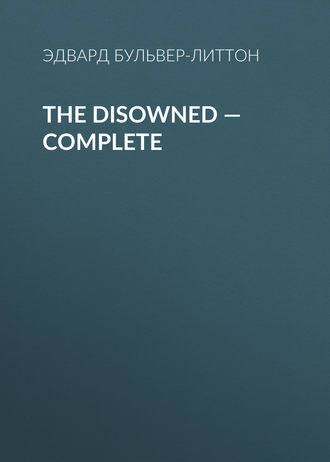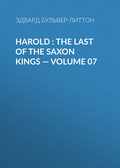
Эдвард Бульвер-Литтон
The Disowned — Complete
“Persuaded, then, that knowledge contained the key to virtue, it was to knowledge that I applied. The first grand lesson which it taught me was the solution of a phrase most hackneyed, least understood; namely, ‘common-sense.’ [Koinonoaemosunae, sensus communis.] It is in the Portico of the Greek sage that that phrase has received its legitimate explanation; it is there we are taught that ‘common-sense’ signifies ‘the sense of the common interest.’ Yes! it is the most beautiful truth in morals that we have no such thing as a distinct or divided interest from our race. In their welfare is ours; and, by choosing the broadest paths to effect their happiness, we choose the surest and the shortest to our own. As I read and pondered over these truths, I was sensible that a great change was working a fresh world out of the former materials of my mind. My passions, which before I had checked into uselessness, or exerted to destruction, now started forth in a nobler shape, and prepared for a new direction: instead of urging me to individual aggrandizement, they panted for universal good, and coveted the reward of Ambition only for the triumphs of Benevolence.”
“This is one stage of virtue; I cannot resist the belief that there is a higher: it is when we begin to love virtue, not for its objects, but itself. For there are in knowledge these two excellences: first, that it offers to every man, the most selfish and the most exalted, his peculiar inducement to good. It says to the former, ‘Serve mankind, and you serve yourself;’ to the latter, ‘In choosing the best means to secure your own happiness, you will have the sublime inducement of promoting the happiness of mankind.’”
“The second excellence of Knowledge is that even the selfish man, when he has once begun to love Virtue from little motives, loses the motives as he increases the love; and at last worships the deity, where before he only coveted the gold upon its altar.”
“And thus I learned to love Virtue solely for its own beauty. I said with one who, among much dross, has many particles of ore, ‘If it be not estimable in itself, I can see nothing estimable in following it for the sake of a bargain.’ [Lord Shaftesbury.]
“I looked round the world, and saw often Virtue in rags and Vice in purple: the former conduces to happiness, it is true, but the happiness lies within and not in externals. I contemned the deceitful folly with which writers have termed it poetical justice to make the good ultimately prosperous in wealth, honour, fortunate love, or successful desires. Nothing false, even in poetry, can be just; and that pretended moral is, of all, the falsest. Virtue is not more exempt than Vice from the ills of fate, but it contains within itself always an energy to resist them, and sometimes an anodyne to soothe,—to repay your quotation from Tibullus,—
‘Crura sonant ferro, sed canit inter opus!’”
[“The chains clank on its limbs, but it sings amidst its tasks.”]
“When in the depths of my soul I set up that divinity of this nether earth, which Brutus never really understood, if, because unsuccessful in its efforts, he doubted its existence, I said in the proud prayer with which I worshipped it, ‘Poverty may humble my lot, but it shall not debase thee; Temptation may shake my nature, but not the rock on which thy temple is based; Misfortune may wither all the hopes that have blossomed around thine altar, but I will sacrifice dead leaves when the flowers are no more. Though all that I have loved perish, all that I have coveted fade away, I may murmur at fate, but I will have no voice but that of homage for thee! Nor, while thou smilest upon my way, would I exchange with the loftiest and happiest of thy foes! More bitter than aught of what I then dreamed have been my trials, but I have fulfilled my vow!’”
“I believe that alone to be a true description of Virtue which makes it all-sufficient to itself, that alone a just portraiture of its excellence which does not lessen its internal power by exaggerating its outward advantages, nor degrade its nobility by dwelling only on its rewards. The grandest moral of ancient lore has ever seemed to me that which the picture of Prometheus affords; in whom neither the shaking earth, nor the rending heaven, nor the rock without, nor the vulture within, could cause regret for past benevolence, or terror for future evil, or envy, even amidst tortures, for the dishonourable prosperity of his insulter! [Mercury.—See the “Prometheus” of Aeschylus.] Who that has glowed over this exalted picture will tell us that we must make Virtue prosperous in order to allure to it, or clothe Vice with misery in order to revolt us from its image? Oh! who, on the contrary, would not learn to adore Virtue, from the bitterest sufferings of such a votary, a hundredfold more than he would learn to love Vice from the gaudiest triumphs of its most fortunate disciples?”
Something there was in Mordaunt’s voice and air, and the impassioned glow of his countenance, that, long after he had ceased, thrilled in Clarence’s heart, “like the remembered tone of a mute lyre.” And when a subsequent event led him at rash moments to doubt whether Virtue was indeed the chief good, Linden recalled the words of that night and the enthusiasm with which they were uttered, repented that in his doubt he had wronged the truth, and felt that there is a power in the deep heart of man to which even Destiny is submitted!
CHAPTER LXIII
Will you hear the letter?
. . . . .
This is the motley-minded gentleman that I have before met in the forest.—As You Like It.
A morning or two after the conversation with which our last chapter concluded, Clarence received the following letter from the Duke of Haverfield:—
Your letter, my dear Linden, would have been answered before, but for an occurrence which is generally supposed to engross the whole attention of the persons concerned in it. Let me see,—ay, three,—yes, I have been exactly three days married! Upon my honour, there is much less in the event than one would imagine; and the next time it happens I will not put myself to such amazing trouble and inconvenience about it. But one buys wisdom only by experience. Now, however, that I have communicated to you the fact, I expect you, in the first place, to excuse my negligence for not writing before; for (as I know you are fond of the literae humaniores, I will give the sentiment the dignity of a quotation)—
“Un veritable amant ne connoit point d’amis;”
[“A true lover recognizes no friends.”—CORNEILLE.]
and though I have been three days married, I am still a lover! In the second place, I expect you to be very grateful that, all things considered, I write to you so soon; it would indeed not be an ordinary inducement that could make me “put pen to paper” (is not that the true vulgar, commercial, academical, metaphorical, epistolary style?) so shortly after the fatal ceremony. So, had I nothing to say but in reply to your comments on state affairs (hang them!) or in applause of your Italian friend, of whom I say, as Charles II. said of the honest yeoman, “I can admire virtue, though I can’t imitate it,” I think it highly probable that your letter might still remain in a certain box of tortoise-shell and gold (formerly belonging to the great Richelieu, and now in my possession), in which I at this instant descry, “with many a glance of woe and boding dire,” sundry epistles, in manifold handwritings, all classed under the one fearful denomination,— “unanswered.”
No, my good Linden, my heart is inditing of a better matter than this. Listen to me, and then stay at your host’s or order your swiftest steed, as seems most meet to you.
You said rightly that Miss Trevanion, now her Grace of Haverfield, was the intimate friend of Lady Flora Ardenne. I have often talked to her—namely, Eleanor, not Lady Flora—about you, and was renewing the conversation yesterday, when your letter, accidentally lying before me, reminded me of you.
Sundry little secrets passed in due conjugal course from her possession into mine. I find that you have been believed by Lady Flora to have played the perfidious with La Meronville; that she never knew of your application to her father! and his reply; that, on the contrary, she accused you of indifference in going abroad without attempting to obtain an interview or excuse your supposed infidelity; that her heart is utterly averse to a union with that odious Lord Boro—bah! I mean Lord Ulswater; and that—prepare, Linden—she still cherishes your memory, even through time, change, and fancied desertion, with a tenderness which—which—deuce take it, I never could write sentiment: but you understand me; so I will not conclude the phrase. “Nothing in oratory,” said my cousin D——, who was, entre nous, more honest than eloquent, “like a break!”—“down! you should have added,” said I.
I now, my dear Linden, leave you to your fate. For my part, though I own Lord Ulswater is a lord whom ladies in love with the et ceteras of married pomp might well desire, yet I do think it would be no difficult matter for you to eclipse him. I cannot, it is true, advise you to run away with Lady Flora. Gentlemen don’t run away with the daughters of gentlemen; but, without running away, you may win your betrothed and Lord Ulswater’s intended. A distinguished member of the House of Commons, owner of Scarsdale, and representative of the most ancient branch of the Talbots,—mon Dieu! you might marry a queen dowager, and decline settlements!
And so, committing thee to the guidance of that winged god, who, if three days afford any experience, has made thy friend forsake pleasure only to find happiness, I bid thee, most gentle Linden, farewell. HAVERFIELD.
Upon reading this letter, Clarence felt as a man suddenly transformed. From an exterior of calm and apathy, at the bottom of which lay one bitter and corroding recollection, he passed at once into a state of emotion, wild, agitated, and confused; yet, amidst all, was foremost a burning and intense hope, which for long years he had not permitted himself to form.
He descended into the breakfast parlour. Mordaunt, whose hours of appearing, though not of rising, were much later than Clarence’s, was not yet down; and our lover had full leisure to form his plans, before his host made his entree.
“Will you ride to-day?” said Mordaunt; “there are some old ruins in the neighbourhood well worth the trouble of a visit.”
“I grieve to say,” answered Clarence, “that I must take my leave of you. I have received intelligence this morning which may greatly influence my future life, and by which I am obliged to make an excursion to another part of the country, nearly a day’s journey, on horseback.”
Mordaunt looked at his guest, and conjectured by his heightened colour, and an embarrassment which he in vain endeavoured to conceal, that the journey might have some cause for its suddenness and despatch which the young senator had his peculiar reasons for concealing. Algernon contented himself, therefore, with expressing his regret at Linden’s abrupt departure, without incurring the indiscreet hospitality of pressing a longer sojourn beneath his roof.
Immediately after breakfast, Clarence’s horse was brought to the door, and Harrison received orders to wait with the carriage at W—— until his master returned. Not a little surprised, we trow, was the worthy valet at his master’s sudden attachment to equestrian excursions. Mordaunt accompanied his visitor through the park, and took leave of him with a warmth which sensibly touched Clarence, in spite of the absence and excitement of his thoughts; indeed, the unaffected and simple character of Linden, joined to his acute, bold, and cultivated mind, had taken strong hold of Mordaunt’s interest and esteem.
It was a mild autumnal morning, but thick clouds in the rear prognosticated rain; and the stillness of the wind, the low flight of the swallows, and the lowing of the cattle, slowly gathering towards the nearest shelter within their appointed boundaries, confirmed the inauspicious omen. Clarence had passed the town of W——, and was entering into a road singularly hilly, when he “was aware,” as the quaint old writers of former days expressed themselves, of a tall stranger, mounted on a neat well-trimmed galloway, who had for the last two minutes been advancing towards a closely parallel line with Clarence, and had, by sundry glances and hems, denoted a desire of commencing acquaintance and conversation with his fellow traveller.
At last he summoned courage, and said, with a respectful, though somewhat free, air, “That is a very fine horse of yours, sir; I have seldom seen so fast a walker: if all his other paces are equally good, he must be quite a treasure.”
All men have their vanities. Clarence’s was as much in his horse’s excellence as his own; and, gratified even with the compliment of a stranger, he replied to it by joining in the praise, though with a modest and measured forbearance, which the stranger, if gifted with penetration, could easily have discerned was more affected than sincere.
“And yet, sir;” resumed Clarence’s new companion, “my little palfrey might perhaps keep pace with your steed; look, I lay the rein on his neck, and, you see, he rivals—by heaven, he outwalks—yours.”
Not a little piqued and incensed, Linden also relaxed his rein, and urged his horse to a quicker step: but the lesser competitor not only sustained, but increased, his superiority; and it was only by breaking into a trot that Linden’s impatient and spirited steed could overtake him. Hitherto Clarence had not honoured his new companion with more than a rapid and slight glance; but rivalry, even in trifles, begets respect, and our defeated hero now examined him with a more curious eye.
The stranger was between forty and fifty,—an age in which, generally, very little of the boy has survived the advance of manhood; yet was there a hearty and frank exhilaration in the manner and look of the person we describe which is rarely found beyond the first stage of youth. His features were comely and clearly cut, and his air and appearance indicative of a man who might equally have belonged to the middle or the upper orders. But Clarence’s memory, as well as attention, was employed in his survey of the stranger; and he recognized, in a countenance on which time had passed very lightly, an old and ofttimes recalled acquaintance. However, he did not immediately make himself known. “I will first see,” thought he, “whether he can remember his young guest in the bronzed stranger after eight years’ absence.”
“Well,” said Clarence, as he approached the owner of the palfrey, who was laughing with childish glee at his conquest, “well, you have won, sir; but the tortoise might beat the hare in walking, and I content myself with thinking that at a trot or a gallop the result of a race would have been very different.”
“I am not so sure of that, sir,” said the sturdy stranger, patting the arched neck of his little favourite: “if you would like to try either, I should have no objection to venture a trifling wager on the event.”
“You are very good,” said Clarence, with a smile in which urbanity was a little mingled with contemptuous incredulity; “but I am not now at leisure to win your money: I have a long day’s journey before me, and must not tire a faithful servant; yet I do candidly confess that I think” (and Clarence’s recollection of the person he addressed made him introduce the quotation) “that my horse
‘Excels a common one
In shape, in courage, colour, pace, and bone.’”
“Eh, sir,” cried our stranger, as his eyes sparkled at the verses: “I would own that your horse were worth all the horses in the kingdom, if you brought Will Shakspeare to prove it. And I am also willing to confess that your steed does fairly merit the splendid praise which follows the lines you have quoted,—
‘Round hoofed, short jointed, fetlocks shag and long,
Broad breast, full eyes, small head, and nostril wide,
High crest, short ears, straight legs, and passing strong,
Thin mane, thick tale, broad buttock, tender hide.’”
“Come,” said Clarence, “your memory has atoned for your horse’s victory, and I quite forgive your conquest in return for your compliment; but suffer me to ask how long you have commenced cavalier. The Arab’s tent is, if I err not, more a badge of your profession than the Arab’s steed.”
King Cole (for the stranger was no less a person) looked at his companion in surprise. “So you know me, then, sir! Well, it is a hard thing for a man to turn honest, when people have so much readier a recollection of his sins than his reform.”
“Reform!” quoth Clarence, “am I then to understand that your Majesty has abdicated your dominions under the greenwood tree?”
“You are,” said Cole, eying his acquaintance inquisitively; “you are.
‘I fear no more the heat of the sun,
Nor the furious winter’s rages;
I my worldly task have done,
Home am gone, and ta’en my wages.’”
“I congratulate you,” said Clarence: “but only in part; for I have often envied your past state, and do not know enough of your present to say whether I should equally envy that.”
“Why,” answered Cole, “after all, we commit a great error in imagining that it is the living wood or the dead wall which makes happiness. ‘My mind to me a kingdom is;’ and it is that which you must envy, if you honour anything belonging to me with that feeling.”
“The precept is both good and old,” answered Clarence; “yet I think it was not a very favourite maxim of yours some years ago. I remember a time when you thought no happiness could exist out of ‘dingle and bosky dell.’ If not very intrusive on your secrets, may I know how long you have changed your sentiments and manner of life? The reason of the change I dare not presume to ask.”
“Certainly,” said the quondam gypsy, musingly, “certainly I have seen your face before, and even the tone of your voice strikes me as not wholly unfamiliar: yet I cannot for the life of me guess whom I have the honour of addressing. However, sir, I have no hesitation in answering your questions. It was just five years ago, last summer, when I left the Tents of Kedar. I now reside about a mile hence. It is but a hundred yards off the high road, and if you would not object to step aside and suffer a rasher, or aught else, to be ‘the shoeing-horn to draw on a cup of ale,’ as our plain forefathers were wont wittily to say, why, I shall be very happy to show you my habitation. You will have a double welcome, from the circumstance of my having been absent from home for the last three days.”
Clarence, mindful of his journey, was about to decline the invitation, when a few heavy drops falling began to fulfil the cloudy promise of the morning. “Trust,” said Cole, “one who has been for years a watcher of the signs and menaces of the weather: we shall have a violent shower immediately. You have now no choice but to accompany me home.”
“Well,” said Clarence, yielding with a good grace, “I am glad of so good an excuse for intruding on your hospitality.
‘O sky!
Why didst thou promise such a beauteous day,
And make me travel forth without my cloak?’”
“Bravo!” cried the ex-chief, too delighted to find a comrade so well acquainted with Shakspeare’s sonnets to heed the little injustice Clarence had done the sky, in accusing it of a treachery its black clouds had by no means deserved. “Bravo, sir; and now, my palfrey against your steed,—trot, eh? or gallop?”
“Trot, if it must be so,” said Clarence, superciliously; “but I am a few paces before you.”
“So much the better,” cried the jovial chief. “Little John’s mettle will be the more up: on with you, sir; he who breaks into a canter loses; on!”
And Clarence slightly touching his beautiful steed, the race was begun. At first his horse, which was a remarkable stepper, as the modern Messrs. Anderson and Dyson would say, greatly gained the advantage. “To the right,” cried the ci-devant gypsy, as Linden had nearly passed a narrow lane which led to the domain of the ex-king. The turn gave “Little John” an opportunity which he seized to advantage; and, to Clarence’s indignant surprise, he beheld Cole now close behind, now beside, and now—now—before! In the heat of the moment he put spurs rather too sharply to his horse, and the spirited animal immediately passed his competitor, but—in a canter!
“Victoria!” cried Cole, keeping back his own steed. “Victoria! confess it!”
“Pshaw,” said Clarence, petulantly.
“Nay, sir, never mind it,” quoth the retired sovereign; “perhaps it was but a venial transgression of your horse, and on other ground I should not have beat you.”
It is very easy to be generous when one is quite sure one is the victor. Clarence felt this, and, muttering out something about the sharp angle in the road, turned abruptly from all further comment on the subject by saying, “We are now, I suppose, entering your territory. Does not this white gate lead to your new (at least new to me) abode?”
“It does,” replied Cole, opening the said gate, and pausing as if to suffer his guest and rival to look round and admire. The house, in full view, was of red brick, small and square, faced with stone copings, and adorned in the centre with a gable roof, on which was a ball of glittering metal. A flight of stone steps led to the porch, which was of fair size and stately, considering the proportions of the mansion: over the door was a stone shield of arms, surmounted by a stag’s head; and above this heraldic ornament was a window of great breadth, compared to the other conveniences of a similar nature. On either side of the house ran a slight iron fence, the protection of sundry plots of gay flowers and garden shrubs, while two peacocks were seen slowly stalking towards the enclosure to seek a shelter from the increasing shower. At the back of the building, thick trees and a rising hill gave a meet defence from the winds of winter; and, in front, a sloping and small lawn afforded pasture for few sheep and two pet deer. Towards the end of this lawn were two large fishponds, shaded by rows of feathered trees. On the margin of each of these, as if emblematic of ancient customs, was a common tent; and in the intermediate space was a rustic pleasure-house, fenced from the encroaching cattle, and half hid by surrounding laurel and the parasite ivy.
All together there was a quiet and old-fashioned comfort, and even luxury, about the place, which suited well with the eccentric character of the abdicated chief; and Clarence, as he gazed around, really felt that he might perhaps deem the last state of the owner not worse than the first.
Unmindful of the rain, which now began to pour fast and full, Cole suffered “Little John’s” rein to fall over his neck, and the spoiled favourite to pluck the smooth grass beneath, while he pointed out to Clarence the various beauties of his seat.
“There, sir,” said he, “by those ponds in which, I assure you, old Isaac might have fished with delight, I pass many a summer’s day. I was always a lover of the angle, and the farthest pool is the most beautiful bathing-place imaginable;—as glorious Geoffrey Chaucer says,—
‘The gravel’s gold; the water pure as glass,
The baukes round the well environing;
And softe as velvet the younge grass
That thereupon lustily come springing.’”
“And in that arbour, Lucy—that is, my wife—sits in the summer evenings with her father and our children; and then—ah! see our pets come to welcome me,” pointing to the deer, who had advanced within a few yards of him, but, intimidated by the stranger, would not venture within reach—“Lucy loved choosing her favourites among animals which had formerly been wild, and, faith, I loved it too. But you observe the house, sir: it was built in the reign of Queen Anne; it belonged to my mother’s family; but my father sold it, and his son five years ago rebought it. Those arms belonged to my maternal ancestry. Look, look at the peacocks creeping along: poor pride theirs that can’t stand the shower! But, egad, that reminds me of the rain. Come, sir, let us make for our shelter.” And, resuming their progress, a minute more brought them to the old-fashioned porch. Cole’s ring summoned a man, not decked in “livery gay,” but, “clad in serving frock,” who took the horses with a nod, half familiar, half respectful, at his master’s injunctions of attention and hospitality to the stranger’s beast; and then our old acquaintance, striking through a small low hall, ushered Clarence into the chief sitting-room of the mansion.







